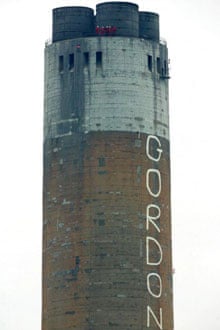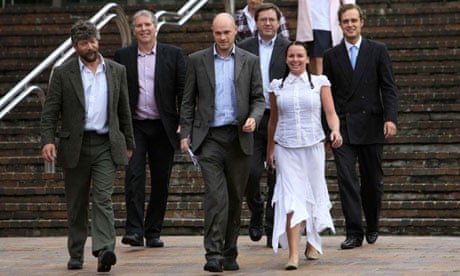Six Greenpeace climate change activists have been cleared of causing £30,000 of criminal damage at a coal-fired power station in a verdict that is expected to embarrass the government and lead to more direct action protests against energy companies.
The jury of nine men and three women at Maidstone crown court cleared the six by a majority verdict. Five of the protesters had scaled a 200-metre chimney at Kingsnorth power station, Hoo, Kent, in October last year.

The activists admitted trying to shut down the station by occupying the smokestack and painting the word "Gordon" down the chimney, but argued that they were legally justified because they were trying to prevent climate change causing greater damage to property around the world. It was the first case in which preventing property damage caused by climate change had been used as part of a "lawful excuse" defence in court. It is now expected to be used more widely by environment groups.
In his summing-up at the end of an eight-day trial, the judge, David Caddick, said the case centred on whether or not the protesters had a lawful excuse for their actions. He told the jury that for this defence to be used it had to be proved that the action was due to an immediate need to protect property belonging to another.
He said allowance for demonstrations did not extend to breaking the law and the jury's task was to examine the boundary line represented by the lawful excuse and to evaluate whether the defendants had crossed the line. He also warned the jury to put aside any feelings towards Greenpeace, climate change or fuel companies during their deliberations.
John Price, prosecuting, had earlier argued that the protesters' actions were "not capable of being lawful". He said: "There are things you can lawfully do in making a protest but there's a line which has to be drawn. When the defendants caused damage to that chimney, it's the line that they crossed."
The court had heard from Professor Jim Hansen, one of the world's leading climate scientists, that the 20,000 tonnes of carbon dioxide emitted daily by Kingsnorth could be responsible for the extinction of up to 400 species. Hansen, a Nasa director who advises Al Gore, the former US presidential candidate turned climate change campaigner, told the court that humanity was in "grave peril". "Somebody needs to step forward and say there has to be a moratorium, draw a line in the sand and say no more coal-fired power stations."
It also heard David Cameron's environment adviser, millionaire environmentalist Zac Goldsmith, and an Inuit leader from Greenland both say climate change was already seriously affecting life around the world. Goldsmith told the court: "By building a coal-power plant in this country, it makes it very much harder [to exert] pressure on countries like China and India" to reduce their burgeoning use of the fossil fuel.
The court was told that some of the property in immediate need of protection included parts of Kent at risk from rising sea levels, the Pacific island state of Tuvalu and areas of Greenland. The defendants also cited the Arctic ice sheet, China's Yellow River region, the Larsen B ice shelf in Antarctica, coastal areas of Bangladesh and the city of New Orleans.
The jury was told that Kingsnorth emitted the same amount of carbon dioxide as the 30 least polluting countries in the world combined - and that there were advanced plans to build a new coal-fired power station next to the existing site on the Hoo peninsula.
Greenpeace used the court's decision to put pressure on the government to abandon plans for a new generation of coal-fired plants. "Today's acquittal is a potent challenge to the government's plans for new coal-fired stations from jurors representing ordinary people in Britain who, after hearing the evidence, supported the right to take direct action in order to protect the climate," said Ben Stewart, the group's communications director and one of the six acquitted. The others were Will Rose, Kevin Drake, Tim Hewke, Huw Williams and Emily Hall.
"It wasn't only us in the dock, it was coal-fired power generation as well," said Hall. "The only people left in Britain who think new coal is a good idea are business secretary John Hutton and the energy minister Malcolm Wicks. It's time the prime minister stepped in and embraced a clean energy future for Britain."
Winning causes
In the last 12 years, court cases involving GM crops and nuclear, chemical and arms companies collapsed after protesters said they had followed their consciences and had been trying to prevent a greater crime.
· 2000 Norwich jury found Greenpeace director Lord Melchett and 27 activists not guilty of causing criminal damage to field of GM crops
· 2000 Five Greenpeace volunteers found not guilty of criminal damage after occupying incinerator
· 1999 Three women cleared of causing £80,000 damage to Trident nuclear submarine computer equipment
· 1996 Liverpool jury acquitted four women who caused £1.5m damage to Hawk fighter jet at British Aerospace factory
